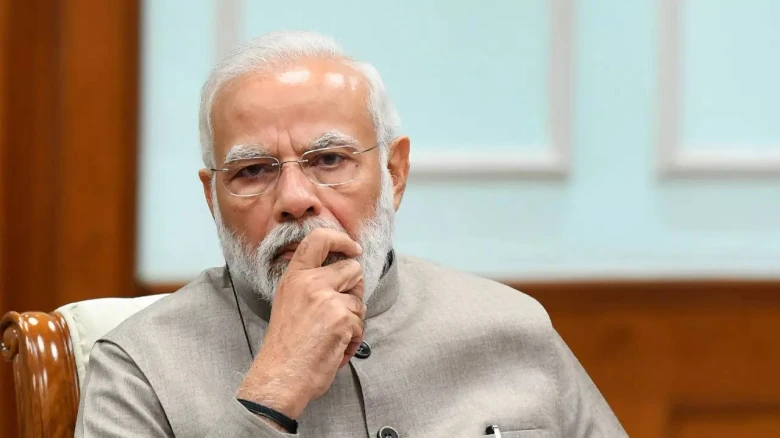A number of celebrity television journalists who prominently figure in the Hindutva imagination as Congress sympathisers due to their apparent support for liberal and secular values were swiftly rendered ineffective after Modi and Shah, through a variety of proxies, took control of the Indian mainstream media by the scruff of the neck. This was shortly after 2014.
Digital Desk: Almost every other day it seems that the Ministry of External Affairs spokesperson issues a statement criticising some international organisation for the unjust actions of the Indian state. The most recent of these are the arrests of Teesta Setalvad, a campaigner, and journalist Mohammed Zubair.
Arindam Bagchi offers the usual rhetorical flourishes: India "strongly opposes...", India "rejects...", and India is a diversified, diverse country that is committed to human rights
The clichés Prime Minister Narendra Modi routinely use while discussing the value of free speech, Gandhian values, the tenacity of Indian democracy, and other subjects during his numerous tours overseas fit in very well with these claims.
But in their own country, Indian authorities routinely violate citizens' fundamental constitutional rights by imprisoning journalists, activists, members of the opposition, and plain residents on bogus charges and then devising absurd defences for their continuing detention.
The Central Bureau of Investigation, the Enforcement Directorate, or the police no longer even make a gallant effort to maintain their claimed autonomy in states where the Bharatiya Janata Party is in power. They successfully follow out the BJP's orders and are prepared to eliminate any threat or bothersome individual.
The arrests of Setalvad and Zubair are a further development in the drawn-out process of atonement that Modi and Shah already initiated. Their goal was very clear: they desired vengeance against everyone they saw to be responsible for Shah's arrest in the Sohrabuddin Sheikh false encounter case and Modi's political exile following the Gujarat riots in 2002.
A number of celebrity television journalists who prominently figure in the Hindutva imagination as Congress sympathisers due to their apparent support for liberal and secular values were swiftly rendered ineffective after Modi and Shah, through a variety of proxies, took control of the Indian mainstream media by the scruff of the neck. This was shortly after 2014.
The next target group was human rights activists and informants who sought to hold Modi and Shah accountable for the Gujarat model of communalization, violence, and slaughter. Former Gujarat police personnel Sanjiv Bhatt, RB Sreekumar, Setalvad, and other are currently detained, and journalist Rana Ayyub has been subjected to continuous harassment and is not allowed to leave the country.
The complete control of the information flow is a key element of what activist-politician Yogendra Yadav has referred to as the "mode of total politics," and the arrests of Setalvad and Zubair represent a crucial step made by the BJP toward that goal. This strategy does not support an independent or autonomous media, a consensus over the parameters of the truth, or even the presentation of disagreeable facts.
German political and legal scholar Carl Schimitt asserts that political theology governs all authority and that it ultimately derives from the sovereign.
Zubair's arrest may have been provoked as retaliation for bringing attention to BJP spokeswoman Nupur Sharma's remarks on Islam, which caused the Modi administration great international embarrassment.
The bigger goal, however, is to send a message that the BJP will no longer tolerate anyone or any organisation that challenges its version of reality, whether it be in regards to the numerous destroyed temples that are allegedly buried beneath mosques, the spectacular successes of the Tughlaqesque folly of demonetisation, or India's valiant defence of its territory against Chinese incursions.
The punishment meted out to social media companies like Twitter and Facebook by the Indian government over the last few years for occasionally daring to hold BJP officials and Hindutva voices accountable for distributing false information or acting abusively shows the same purpose. A revisionist, Hindu nationalist account of Indian history is to be implemented at every level of the national educational system, as well as in colleges abroad, through the BJP's Hindutva affiliates in the US and other countries, as has been abundantly documented.
Questioning the BJP's interpretation of any past or present incident, as well as Prime Minister Modi's lofty pronouncements about India's future under his leadership, is now blasphemy on par with "hurting religious emotions."
The arrest of Setalvad and Zubair, which was extensively broadcast by television networks, is pure totalitarian theatre.
Modi shares a similar dictatorial attitude with former US President Donald Trump and possesses a keen sense of the dramatic. Like Trump, Modi is prone to lengthy episodes of self-pity, frequently breaking down in tears in front of an audience as he thinks back to his own hardships. Like many strongmen, Modi fits several of the descriptions made in this article by Peter York, author of Dictator Style: Lifestyles of the World's Most Colorful Despots, including wearing ostentatious brands or razing historical structures to build what many people would consider monstrosities in their place.
The humiliation and punishment of opponents in front of others is a fundamental component of authoritarian aesthetics. This includes the harassment of actor Sonu Sood by the Income Tax department, the Enforcement Directorate's repeated summonses of Congressman Rahul Gandhi, and the arrests of Modi detractors for made-for-television reasons. However, they are disguised in the language of democracy, constitutionality, and the rule of law in the Indian setting.
The efforts of Mohammed Saeed Al-Sahaf, the late Iraqi president Saddam Hussein's information minister, to brashly claim on television that there were no American tanks in Baghdad while said non-existent tanks could be seen rolling in the background are reminiscent of India's denials of international criticism.
Similar to other countries, India does not practise censorship, violate the rights of minorities, make unlawful arrests, or restrict religious freedom. India simply needs to make its case to the world a little stronger.

Leave A Comment